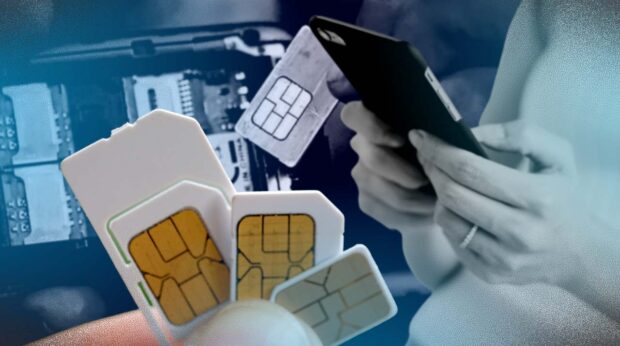
SIM card. INQUIRER FILE PHOTO
MANILA, Philippines — Selling your registered SIM (subscriber identity module) card with a verified e-wallet account may result in your personal information being compromised and used to set up fraudulent accounts to take out loans, make online purchases and engage in online gambling, a financial technology group has warned.
“By selling your verified digital wallet, you are essentially handing out your data to cybercriminals and helping them carry out their criminal activities,” Fintech Alliance PH founding chair Lito Villanueva told the Inquirer in an interview.
Incidents of Filipinos falling prey to cyberscammers who offer to buy their SIM and e-wallet accounts have underscored the need to strengthen financial literacy among e-wallet users, Villanueva said.
To help address this concern, Fintech Alliance PH will be rolling out an education campaign on multistakeholder national cybersecurity, he added.
Phishing made easier
Recently, cybersecurity company Kaspersky reported that some Filipinos were selling their digital wallet accounts for as low as P150 each on social media.
“We’ve witnessed how Filipinos embraced the cashless lifestyle during the pandemic out of necessity,” said Kaspersky general manager for Southeast Asia Yeo Siang Tiong.
The ease of access and convenience of using digital wallets have made more people quite comfortable with it and complacent enough to sell, rent out or even loan their verified accounts
“By doing so, cybercriminals [no longer] need to put much effort into phishing as Filipinos are practically giving away their personal data for a song, which is really dangerous,” Yeo said.
A digital wallet, the Kaspersky executive noted, contains personal information such as the owner’s full name, date of birth, nationality, phone number, email address, and mailing address.
“Losing [one’s] identity is very likely especially when one’s [personal] data gets into the hands of scammers,” Yeo added.
Gambling, loans
Giving hackers access to personal information will allow them to set up another financial account using the digital wallet owner’s identity. The buyer of the account can then make purchases on behalf of the seller, use the personal details for online gambling and even take out loans under the seller’s name.
The personal information can also be resold for malicious purposes on the dark web, the cybersecurity expert warned.
Once handed over, it would be difficult for SIM sellers to regain control of their personal information, Yeo said. He suggested that sellers immediately replace their email address and mobile number, and change their passwords in their social media and financial accounts.
Cyberscams involving SIM cards and e-wallets have been on the rise in recent days, the latest involving the loss of millions of pesos among users of leading e-wallet GCash, in what was initially suspected to be a hacking operation.
The Department of Information and Communications Technology and Globe Telecom later maintained, however, that the incidents involved phishing, with the affected users having opened links to online gambling sites.
Extension, confusion
On April 25, Malacañang announced the 90-day extension of the SIM card registration, which was originally set for April 26.
During the extension period, the government said it expects to register up to 20 million active SIM cards in order to reach its target of 100 million, with the remainder described as “disposable,” including those used in text scams.
In the run-up to the original April 26 government deadline for compulsory SIM registration, the Philippine National Police Anti-Cybercrime Group said it had noticed a surge in cases involving e-wallet scams. Scammers, the PNP group noted, took advantage of the public’s confusion and panic over the deadline and misrepresented themselves, urging people to click links to register their e-wallet accounts separately. There is no need to do so, an e-wallet company clarified, as the e-wallet account is automatically registered with one’s SIM.
According to the National Telecommunications Commission, as of May 18, some 96.4 million SIM cards had been registered, with 46 million registrations from Smart Communications Inc., 44 million from Globe and 6 million from DITO Telecommunication Corp.